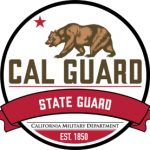The California Military Department (CMD) is committed to promoting and protecting the privacy rights of individuals, as enumerated in Article 1 of the California Constitution, the Information Practices Act of 1977, and other state and federal laws.
It is the policy of the CMD to limit the collection and safeguard the privacy of personal information collected or maintained by the CMD. The CMD’s information management practices conform to the requirements of the Information Practices Act (Civil Code Section 1798 et seq.), the Public Records Act (Government Code Section 6250 et seq.), Government Code Sections 11015.5 and 11019.9, and other applicable laws pertaining to information privacy.
The CMD follows these principles in collecting and managing personal information: We collect personal information on individuals only as allowed by law. We limit the collection of personal information to what is relevant and necessary to accomplish a lawful purpose of the CMD. For example, we may need to know someone’s email address or telephone number, among other things, to provide requested assistance.
Personal information, as defined in the Information Practices Act, is information that identifies or describes an individual including, but not limited to, name, Social Security number, physical description, home address, home telephone number, education, financial matters, and medical or employment history.
We do not collect home, business or e-mail addresses, or account information from persons who simply browse our Internet website. The CMD collects personal information about individuals through our website only if an individual provides such information to the CMD voluntarily through forms or surveys. The information that the CMD automatically collects includes the domain name or Internet Protocol address that relates to the machine used to access the CMD’s website, the type of browser and operating system used, the date and time when the website is visited, web pages displayed, and any forms that are uploaded.
We do not use session cookies on this website. Cookies are small text files placed on your computer, often without your knowledge, while visiting certain sites on the Internet used to identify your computer. For example, cookies are used by some sites to greet you personally, to post a list of your favorite books to purchase, to remember what you had in your shopping basket the last time you visited. The session cookies are used to facilitate the interaction between you and the fields in the form.
You can prevent cookies from being placed on your computer by accessing your browser’s preferences menu and deleting existing cookies. There also are commercial programs available to help you manage cookies. Before taking such steps, you should be aware that some websites may not work properly if you choose to block the placement of cookies on your computer. You will need to decide whether enabling cookies outweigh privacy concerns.
We strive in each instance to tell people who provide personal information to the CMD the purpose for which the information is collected. At the time of collection, we also strive to tell persons who are asked to provide personal information about the general uses that we will make of that information.
We tell people who provide personal information about their opportunity to review that information. The CMD allows individuals who provide personal information to review the information and contest its accuracy or completeness.
We only use or disclose personal information for the specified purposes, or purposes consistent with those purposes, unless we get the consent of the subject of the information, or unless required by law or regulation. The Public Records Act exists to ensure that government is open and that the public has a right to have access to appropriate records and information possessed by state government. At the same time, there are exceptions in both state and federal law to the public’s right to access public records. These exceptions serve various needs including maintaining the privacy of individuals. In the event of a conflict between this Policy and the Public Records Act, the Information Practices Act or other law governing the disclosure of records, the applicable law will control. We use information security safeguards. We take reasonable precautions to protect the personal information collected or maintained by the CMD against loss, unauthorized access, and illegal use or disclosure. The CMD uses encryption software to protect the security of individuals’ personal information during transmission of such information through the CMD’s websites. Such personal information is stored by the CMD in secure locations. The CMD’s staff is trained on procedures for the management of personal information, including limitations on the release of information. Access to personal information is limited to those members of the CMD’s staff whose work requires such access. Confidential information is destroyed according to the CMD’s records retention schedule. The CMD conducts periodic reviews to ensure that proper information management policies and procedures are understood and followed.
Please note that our Privacy Policy reflects the CMD’s current business practices and is subject to change without notice.
If you have questions or would like additional information regarding the CMD’s privacy policy, you may contact us at 916.854.3000.
Federal Privacy Act 1974 Information
State of California Online Privacy Information
Updated: 02/01/2018
